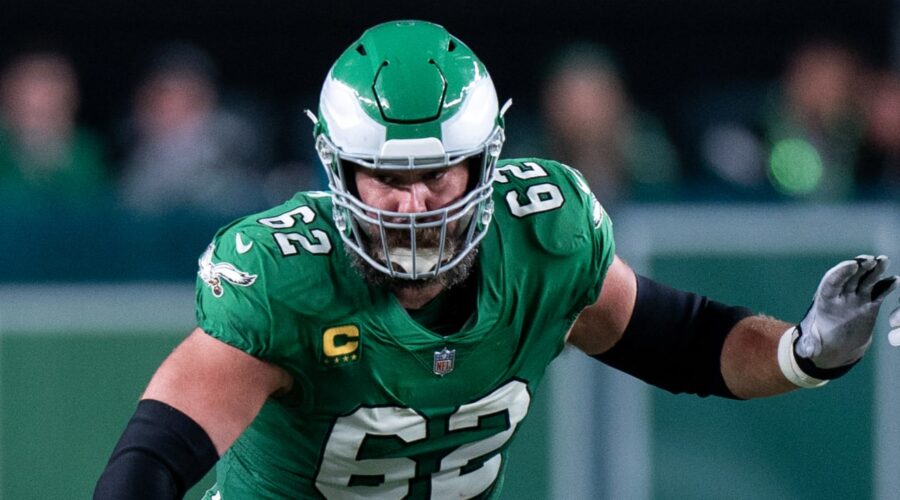Jason Kelce explains why Eagles have 'leg up' on quarterback sneak play: 'We've repped it a lot'
Ask any NFL fan these days, and they probably have an opinion on the “Brotherly Shove,” the “Tush Push” or whatever you call the Philadelphia Eagles’ super short-yardage play — the one that’s been as close to automatic as anything going in the game these days.
Eagles fans love it. Their opponents surely don’t — even if many try to incorporate the modified quarterback sneak play into their own arsenals. Some coaches have even said publicly they want the play banned.
But then again, most other teams don’t have the success rate the Eagles do when they try to deploy it. Philadelphia’s version starts with QB Jalen Hurts lining up behind center Jason Kelce, typically with two or three other Eagles players encircling Hurts. When Kelce snaps the ball, Hurts plunges forward, aided by his teammates’ shoves.
And it almost always ends in an Eagles first down, and sometimes in a touchdown.
The play has been nearly impossible for opponents of the Eagles to stop — Philly was 4 for 4 using it against the Dolphins on Sunday — but also difficult to mimic. Kelce said in an interview Thursday with NFL Network’s Steve Wyche and James Palmer on The NFL Report that the mechanics of the play are a lot trickier to master than it might look on TV.
“We’ve repped it a lot,” Kelce said. “It’s not uncommon to fumble a snap on a quarterback sneak. … As soon as that ball is moving, you’re moving forward or changing your leverage and bending down. The quarterback is already moving forward to be able to start pushing. If you do not rep that exact mechanism, and all of a sudden in the first time in a game you’re doing it for the first time, it’s going to feel weird.”
Related Links
- NFL QB Index, Week 8: Patrick Mahomes vaults back to No. 1; Kirk Cousins closing in on top five
- Week 8 NFL picks: Bills unanimously taken over Bucs on Thursday night; Bengals or 49ers on Sunday?
- NFL RB Index, Week 8: Top five 2024 free agent running backs
Kelce and Hurts might be the key pieces of the operation, but Kelce said the real secret is that it’s crucial to get the timing of everyone down to make it really work.
“It’s important even in practice — especially before you run it in a game at all during the season or with a new quarterback — to really get that feeling down with the guy,” Kelce said. “It’s not just the center-quarterback, it’s everybody across the board. How we’re hitting the blocks, where we’re starting, who’s working with who.”
But the Eagles have gotten so good at it that head coach Nick Sirianni isn’t afraid to break it out at almost any time. Sunday against the Dolphins, the Eagles’ offense was originally sent off the field for the punt team on fourth-and-1 from their own 26-yard line, with Philly clinging to a seven-point lead.
After a moment of thought, Sirianni sent his offense back out there. Naturally, they converted.
Now Sirianni is facing questions about the play and whether it should be part of football. His retort? The fact that it’s hard to master is why it shouldn’t be banned.
“You’ve seen it across the league, that people can’t do it like we can do it,” Sirianni said this week. “They can’t do it like we can do it. And so I’m making my plug right there: Don’t ban this play.
“If everybody could do it, everybody would do it.”
The Eagles have earned their sweat equity in the “Brotherly Shove.” Kelce said their success rate is directly tied to their commitment to mastering their craft. If other teams want to be good at it, they’re going to have to spend more time practicing it.
“There’s a lot of details and minute things that, quite frankly, we have a leg up on because we run the play so much,” Kelce said. “It’s a play that you get to rep a lot in practice, so each one of these reps in a game is a pretty substantial rep above the next opponent in terms of running the play in general.
“So I think all of these chances we get to run it in a game, and to run it at full speed, ultimately make us more detailed and more efficient at running the play in general.”
The NFL report airs Monday and Thursday at 7:15 p.m. ET on the NFL Channel on FAST networks and is available wherever you get your podcasts.
Source: Read Full Article
